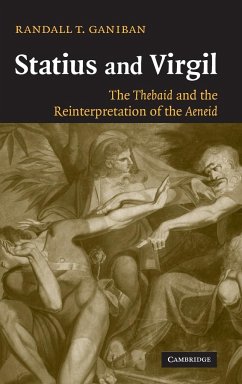At the end of the Thebaid, Statius enjoins his epic 'not to compete with the divine Aeneid but rather to follow at a distance and always revere its footprints'. The nature of the Thebaid's interaction with the Aeneid is, however, a matter of debate. This book argues that the Thebaid reworks themes, scenes, and ideas from Virgil in order to show that the Aeneid's representation of monarchy is inadequate. It also demonstrates how the Thebaid's fascination with horror, spectacle, and unspeakable violence is tied to Statius' critique of the moral and political virtues at the heart of the Aeneid. Professor Ganiban offers both a new way to interpret the Thebaid and a largely sequential reading of the poem.
Hinweis: Dieser Artikel kann nur an eine deutsche Lieferadresse ausgeliefert werden.
Hinweis: Dieser Artikel kann nur an eine deutsche Lieferadresse ausgeliefert werden.








